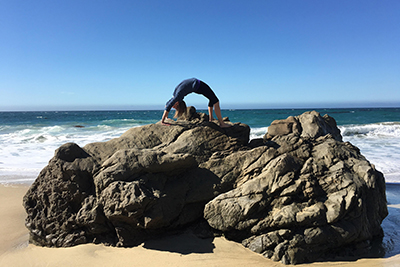1: It has stood the test of time - People have been doing mindfulness for centuries
 Mindfulness is based on the wisdom of certain practices originating in the Buddhist tradition, and in other religions too. Mindfulness can be achieved, like it has been for over a thousand years, via yoga, meditation, and breathing techniques.
Mindfulness is based on the wisdom of certain practices originating in the Buddhist tradition, and in other religions too. Mindfulness can be achieved, like it has been for over a thousand years, via yoga, meditation, and breathing techniques.
A practical tip: One way in which you can practice mindfulness is by setting aside some time each day to practice a simple exercise. For this exercise you need to sit silently and pay attention to the sensations of your breathing, bringing your attention back to just focusing on the sensation of your breathing whenever the mind wanders (it sounds rather easy, but you’ll find it does take a bit of effort). See this NHS site for more details.
2: Mindfulness can help you manage something we all experience - pain
The human condition includes pain, it is unavoidable, but the mind and body don’t have to just instinctively react to painful experiences. Mindfulness is a skill that allows us to be less responsive to what is happening in the present moment. It is a way of relating our experiences (positive, negative and neutral) in a particular way, so that our overall suffering is reduced and our sense of well-being improved.
A practical tip: Ruby Wax talks about how mindfulness has made a difference to her life in terms of managing depression and pain (see below for a short clip about Ruby’s experiences).
However, like Ruby says “…you can’t go to the gym and just do one sit up”, as with physical exercise, mindfulness takes practice.
3: Most of us can get really stuck in mindlessness
If we are really honest with ourselves we are infrequently mindful. We are usually caught up in unhelpful patterns of thinking or are focused on things unrelated to the present moment, this is mindlessness. For instance, when it comes to meal times most of us are eating too quickly to actually think about what we are consuming, and to attend to the experience we are having whilst devouring our food.
A practical tip: Slow down at meal times, switch off the television or computer, and create a space so that you can savour the textures and flavours of the food you are eating, and attend to the experience.
4: Many people are already benefiting from mindfulness in the United Kingdom and abroad
The focus of this year’s Mental Health Awareness Week was mindfulness, that’s because the Mental Health Foundation thought it was something that is really beneficial. Mindfulness has become increasingly cited in research too, back in 1970 about two dozen articles were published related to mindfulness, by 2014 there were nearly 20,000 articles.
A practical tip: Try out this Mental Health Foundation podcast (“Mindfulness – 10 minute practice exercise) narrated by mindfulness expert, Professor Mark Williams
5: We can all take time to ‘stop and smell the roses’
When we heard that there was going to be a focus on mindfulness in an up-coming episode of the ‘All in the Mind’ series, as a team at the Open University we all started talking about times when we were unintentionally in a state of mindlessness, this happens for people who have used mindfulness therapeutically. Hence we all need to remind ourselves about the value of mindfulness.
A practical tip: Take a stroll outdoors, notice how plants and trees change with the season, the smells that meet your nose, how the temperature feels on your skin and savour being in that particular moment.
This resource is part of the 'Wellbeing and Mental Health Collection' created by the Open University in Wales. You can learn more and find courses, articles and other activities on the collection's homepage.










Rate and Review
Rate this article
Review this article
Log into OpenLearn to leave reviews and join in the conversation.
Article reviews
I have been practicing meditation and mindfulness for about a year now. I started by going to a buddhist center and practicing mindfulness breathing and Metta Bhavna (Loving Kindness visualisations). I graduated on to Vipassana which quite frankly is a little bit hardcore for most people to begin with as it involves a silent (yes thats right, no speaking or even whistling) retreat for ten days. In that ten days you wake at 4am and go to bed at 9.30pm and on average meditate without moving for hour periods over about eleven hours in total. Oh and you are deprived of all mental stimulus and distractions for that period, including books, TV, religous symbols, music and even masturbation!!! Its not for the faint hearted but it can be life changing to ones mental health and outlook on life. It was for me anyway.
Martyn Jukes - 4 November 2017 4:11pm
I have been practicing meditation and mindfulness for about a year now. I started by going to a buddhist center and practicing mindfulness breathing and Metta Bhavna (Loving Kindness visualisations). I graduated on to Vipassana which quite frankly is a little bit hardcore for most people to begin with as it involves a silent (yes thats right, no speaking or even whistling) retreat for ten days. In that ten days you wake at 4am and go to bed at 9.30pm and on average meditate without moving for hour periods over about eleven hours in total. Oh and you are deprived of all mental stimulus and distractions for that period, including books, TV, religous symbols, music and even masturbation!!! Its not for the faint hearted but it can be life changing to ones mental health and outlook on life. It was for me anyway.